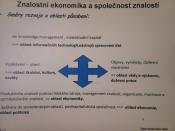The Manual Worker replaced by the Knowledge Worker
Drucker saw the knowledge worker come of age in the 21st century. In order to analyse its effects and application methods, Drucker compared the Knowledge worker to the prior economy consisting of the "Manual Worker". The Knowledge economy is more focused on people's knowledge as the main asset, whereas the Manual-Worker economy is focused on production equipment and non-human capital. To assist Drucker's comparison, he focused on the productivity of the knowledge economy, whilst claiming productivity was unheard of in the age (the 20th century) of the manual worker. Productivity emerged from gaining knowledge rather than doing monotonous actions, which are common amongst manual workers.
Drucker claims Taylorism showed that unskilled, repetitive motions were utilised with manual work and in order for manual work to be more productive, knowledge needed to be applied to these uneducated motions. How? By re-organising or re-engineering these motions.
The future of the Manual Worker is bleak as more organisations in developed countries were moving away from manufacturing (popular for manual work) and towards an economy based on knowledge work. "More employees are working with their minds than with their muscles. Their value lies in their mental abilities and their knowledge."
The Knowledge Worker: who or what is it?
A knowledge worker is one who generates a high proportion of wealth by leveraging his or her know-how. Being a knowledge worker does not mean that the worker must be involved in information technology economy. It is about whether the worker has a unique know-how;
knowledge of a specialised industrial process qualifies just as much as knowledge of a process involving latest electronic hardware or software.
In order for the 21st century to be the "age" of the knowledge economy, the knowledge worker must continually improve productivity.


